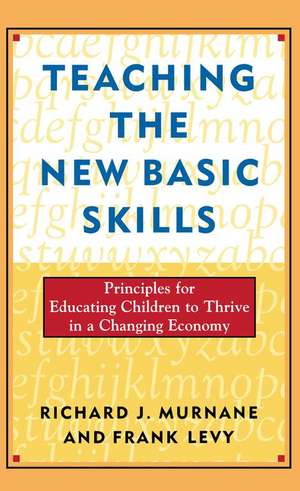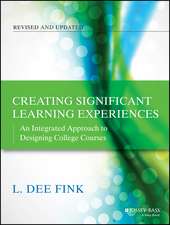Teaching the New Basic Skills
Autor Richard J. Murnaneen Limba Engleză Hardback – 31 aug 1996
Richard Murnane and Frank Levy begin by describing the hiring processes of best practice firms like Northwestern Mutual Life and Honda of America. In today's competitive economy, these firms search for applicants with the New Basic Skills -- the mix of hard and soft skills that all high-wage employers now require. Murnane and Levy then shift their analysis to schools, asking how they can more effectively teach these New Basic Skills. By using case studies the authors show that popular school reform proposals -- higher standards, school choice, national standards, charter schools, more money -- can only be the first half of a solution to the nation's school problem. When they work as advertised, they force a school to change the way it does business. But each of these reforms needs a second half, a strategy for guiding schools toward the changes that raise student skills.
The authors show how that strategy rests on five management principles that focus a school on student achievement. These principles grow out of the experiences of real schools doing the dirty work of educational reform: an elementary school in East Austin, Texas organizing low-income Hispanic parents around higher educational performance, an affluent New England community retraining its teachers, the state of Vermont devising new ways to measure the math skills employers require, a Boston high school creating incentives for low-income minority students to devote more time and attention to schoolwork.
Superintendents, governors and business leaders agree on the importance of this book as evidenced in the forewords by Robert Galvin, Chairman of Motorola, and Thomas Payzant, school superintendent of Boston. For those who care about the success of U.S. schools, Teaching the New Basic Skills is an optimistic guide to the future and a must read.
Preț: 287.87 lei
Nou
Puncte Express: 432
Preț estimativ în valută:
55.09€ • 56.92$ • 45.82£
55.09€ • 56.92$ • 45.82£
Carte disponibilă
Livrare economică 26 februarie-12 martie
Preluare comenzi: 021 569.72.76
Specificații
ISBN-13: 9780684827391
ISBN-10: 0684827395
Pagini: 272
Dimensiuni: 153 x 219 x 25 mm
Greutate: 0.47 kg
Editura: Free Press
ISBN-10: 0684827395
Pagini: 272
Dimensiuni: 153 x 219 x 25 mm
Greutate: 0.47 kg
Editura: Free Press
Notă biografică
Richard J. Murnane is a Professor at the Harvard Graduate School of Education. Frank Levy is the Daniel Rose Professor of Urban Economics at MIT. Both authors live in Newton, Massachusetts.
Textul de pe ultima copertă
Fifteen years ago, a U.S. high school diploma was a ticket to the middle class. No longer. The skills required to earn a decent income have changed radically. The skills taught in most U.S. schools have not. Today the average 30-year-old person with a high school diploma earns $20,200, and the nation faces of future of growing inequality and division. Teaching the New Basic Skills shows how to avoid such a future. By telling stories of real people in real businesses and real schools, the book shows the skills students need to get decent jobs and how schools can change to teach those skills. Richard Murnane and Frank Levy begin by describing the hiring processes of best practice firms like Northwestern Mutual Life and Honda of America. In today's competitive economy, these firms search for applicants with the New Basic Skills - the mix of hard and soft skills that all high-wage employers now require. Murnane and Levy then shift their analysis to schools, asking how they can more effectively teach these New Basic Skills. By using case studies the authors show that popular school reform proposals - higher standards, school choice, national standards, charter schools, more money - can only be the first half of a solution to the nation's school problem. When they work as advertised, they force a school to change the way it does business. But each of these reforms needs a second half, a strategy for guiding schools toward the changes that raise student skills. The authors show how that strategy rests on five management principles that focus a school on student achievement. These principles grow out of the experiences of real schools doing the dirty work of educational reform: an elementaryschool in East Austin, Texas organizing low-income Hispanic parents around higher educational performance, an affluent New England community retraining its teachers, the state of Vermont devising new ways to measure the math skills employers require, a Boston high school creating incentives for low-income minority students to devote more time and attention to schoolwork.
Descriere
This is not a magic bullet, school reform book. It's a real plan, for real progress. Drawing on the work of real teachers, parents and administrators, this book provides a blueprint for turning our schools around--from the retraining of teachers to the developemtn of measures that will accurately chart student progress in the development of their new abilities.
Cuprins
Contents
Foreword by Thomas W. Payzant
Foreword by Robert W. Galvin and Edward W. Bales
Acknowledgments
Part I. Introduction
Chapter 1. Preparing to Meet the Future
Part II. Firms and Skills
Chapter 2. Skills for a Middle-Class Wage
Chapter 3. Five Principles for Managing Frontline Workers
Part III. Schools
Chapter 4. The First Principle: Agree on the Problem
Chapter 5. The Second Principle: Provide the Right Incentives and Opportunities
Chapter 6. The Third Principle: Train the Frontline Workers
Chapter 7. The Fourth Principle: Measure Progress Regularly
Chapter 8. The Fifth Principle: Persevere and Learn from Mistakes; There Are No Magic Bullets
Chapter 9. Getting from Here to There
Endnotes
Index












